
Jefferson Airplane was an American rock band formed in San Francisco, California in 1965. One of the pioneering bands of psychedelic rock, the group defined the San Francisco Sound and was the first from the Bay Area to achieve international commercial success. They headlined the Monterey Pop Festival (1967), Woodstock (1969), Altamont Free Concert (1969), and the first Isle of Wight Festival (1968) in England. Their 1967 breakout album Surrealistic Pillow was one of the most significant recordings of the Summer of Love. Two songs from that album, "Somebody to Love" and "White Rabbit", are among Rolling Stone's "500 Greatest Songs of All Time".

Jefferson Starship is an American rock band from San Francisco, California, formed in 1974 by a group of musicians including former members of Jefferson Airplane. Between 1974 and 1984, they released eight gold or platinum-selling studio albums, and one gold-selling compilation. The album Red Octopus went double-platinum, reaching No. 1 on the Billboard 200 chart in 1975. The band went through several major changes in personnel and genres through the years while retaining the Jefferson Starship name. The band name was retired in 1984, but it was picked up again in 1992 by a revival of the group led by Paul Kantner, which has continued since his death in 2016.
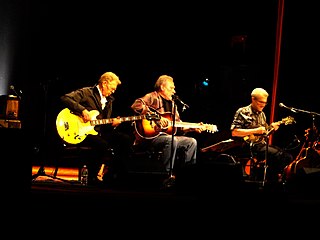
Hot Tuna is an American blues rock band formed in 1969 by former Jefferson Airplane members Jorma Kaukonen (guitarist/vocals) and Jack Casady (bassist). Although it has always been a fluid aggregation, with musicians coming and going over the years, the band's center has always been Kaukonen and Casady's ongoing collaboration.
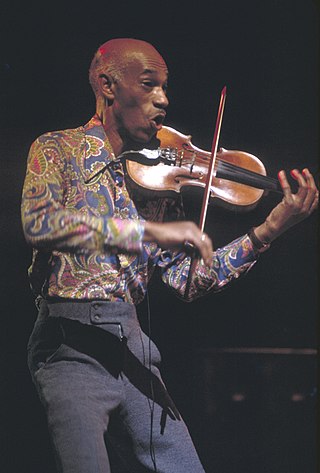
John Henry Creach, better known as Papa John Creach, was an American blues violinist who also played classical, jazz, R&B, pop and acid rock music. Early in his career, he performed as a journeyman musician with Louis Armstrong, Fats Waller, Stuff Smith, Charlie Christian, Big Joe Turner, T-Bone Walker, Nat King Cole and Roy Milton.

Jorma Ludwik Kaukonen, Jr. is an American blues, folk, and rock guitarist. Kaukonen performed with Jefferson Airplane and still performs regularly on tour with Hot Tuna, which started as a side project with bassist Jack Casady, and as of early 2024 has continued for 55 years. Rolling Stone magazine ranked him No. 54 on its list of 100 Greatest Guitarists. He was inducted into the Rock and Roll Hall of Fame in 1996 as a member of Jefferson Airplane.
KBC Band was formed in 1985 by former Jefferson Airplane members Paul Kantner, Marty Balin and Jack Casady (bass). Other members included Keith Crossan, Tim Gorman, Slick Aguilar and Darrell Verdusco (drums). Their sole LP, KBC Band, featured the singles "America" and "It's Not You, It's Not Me."
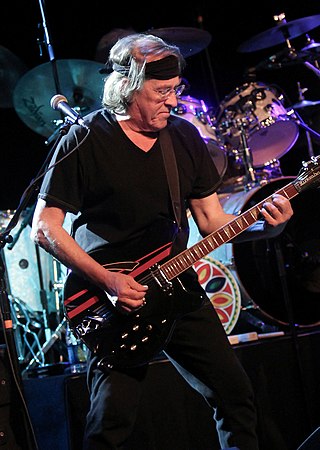
Paul Lorin Kantner was an American rock musician. He is best known as the co-founder, rhythm guitarist, and a secondary vocalist of Jefferson Airplane, a leading psychedelic rock band of the counterculture era. He continued these roles as a member of Jefferson Starship, Jefferson Airplane's successor band.

Bark is the sixth studio album by American rock band Jefferson Airplane. Released in 1971 as Grunt FTR-1001, the album is one of the Airplane's late-period works, notable for the group's first personnel changes since 1966. The album was the first without band founder Marty Balin and the first with violinist Papa John Creach. Drummer Spencer Dryden had been replaced by Joey Covington in early 1970 after a lengthy transitional period in which both musicians had performed with the band.

Long John Silver is the seventh studio album by the American rock band Jefferson Airplane, and their last album of all new material until 1989. It was recorded and released in 1972 as Grunt FTR-1007.

Jefferson Airplane is the eighth and final studio album by San Francisco rock band Jefferson Airplane, released on Epic Records in 1989. Marty Balin, Paul Kantner, Grace Slick, Jorma Kaukonen and Jack Casady all returned for the album and supporting tour, though Spencer Dryden did not participate. The album and accompanying tour would mark the last time Jefferson Airplane would perform together until their 1996 induction to the Rock and Roll Hall of Fame.

The Worst of Jefferson Airplane is the first compilation album from the rock band Jefferson Airplane, released in November 1970 as RCA Victor LSP-4459. The "Worst" in the title is ironic, as the album features all of Jefferson Airplane's hit singles up to that point. It peaked at #12 on the Billboard 200 in 1971 and has since gone platinum.
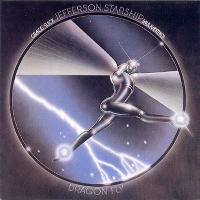
Dragon Fly is the debut album by Jefferson Starship, released on Grunt Records in 1974. It peaked at No. 11 on the Billboard 200, and has been certified a gold album. Credited to Grace Slick, Paul Kantner, and Jefferson Starship, the band itself was a turning point after a series of four albums centering on the partnership of Kantner and Slick during the disintegration of Jefferson Airplane through the early 1970s.

Flight Log (1966–1976) is a compilation album by the American rock band Jefferson Airplane. Released in January 1977 as a double-LP as Grunt CYL2-1255, it is a compilation of Jefferson Airplane and Airplane-related tracks, including tracks by Jefferson Starship and Hot Tuna, as well as solo tracks by Paul Kantner, Grace Slick, and Jorma Kaukonen. Although primarily a compilation album, the album includes one previously unreleased song: "Please Come Back" written by Ron Nagle and performed by Jefferson Starship. "Please Come Back" is not available on any other release.
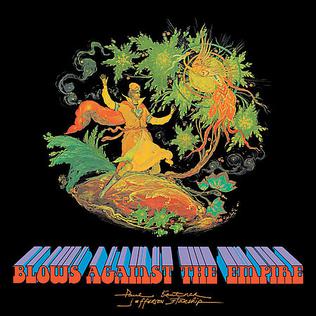
Blows Against the Empire is a concept album by Paul Kantner, released in 1970 under the name Paul Kantner and Jefferson Starship. It is the first album to use the "Starship" moniker, a name which Kantner and Grace Slick would later use for the band Jefferson Starship that emerged after Jack Casady and Jorma Kaukonen left Jefferson Airplane. From a commercial standpoint, it performed comparably to Jefferson Airplane albums of the era, peaking at No. 20 on the Billboard 200 and receiving a RIAA gold certification. It was one of the first two albums to be nominated for a Hugo Award in the category of Best Dramatic Presentation.

Grunt Records was a vanity label founded in 1971 by Jefferson Airplane and distributed by RCA Records. Initially created to sign local Bay Area acts, the label later was used only for Jefferson Starship and Hot Tuna releases. The label ended use in 1987 after Grace Slick left Starship.
Peter Kaukonen is an American guitarist, multi-instrumentalist and songwriter based in the San Francisco Bay Area. He is the younger brother of Jorma Kaukonen from Jefferson Airplane and Hot Tuna. Peter Kaukonen has played, toured, and recorded with Jefferson Airplane, Jefferson Starship, Hot Tuna, Johnny Winter, Link Wray, Terry Allen, Ruthann Friedman, as well as his own band, Black Kangaroo.

"The Ballad of You and Me and Pooneil" is a song by the American psychedelic rock band Jefferson Airplane. Written by Paul Kantner, the song initially appeared as an RCA Victor single, and then subsequently as the first track of their third album, After Bathing at Baxter's, in a substantially remixed version.
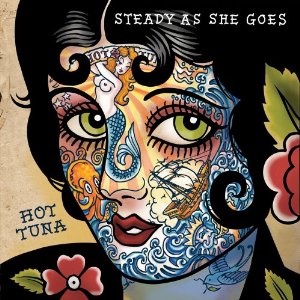
Steady as She Goes is a 2011 album by Hot Tuna, the band's first studio album since 1990. After Jorma Kaukonen recorded his solo album in 2009 at Levon Helm's studio in NY, he asked his new record company Red House if they would be interested in a Tuna album. The band started recording new tracks in November 2010 with the same producer and studio that Kaukonen used for River of Time and features the latest lineup of the band that formed in 2009 when Skoota Warner joined on drums. On March 11, 2011, Red House released "Angel of Darkness" as a free single. The album was released on CD and on iTunes April 5, 2011 and was released on vinyl in May. The album first charted on the Tastemaker and Independent album lists compiled by Billboard for the week of April 23.
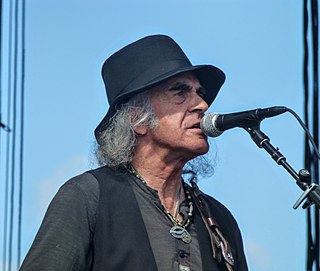
Peter Roy Sears is an English rock musician. In a career spanning more than six decades, he has been a member of many bands and has moved through a variety of musical genres, from early R&B, psychedelic improvisational rock of the 1960s, folk, country music, arena rock in the 1970s, and blues. He usually plays bass, keyboards, or both in bands.



















